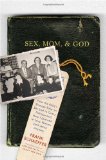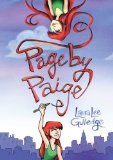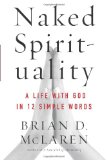Okay, last Fall, when James Kennedy sent me a copy of Der Orden der Seltsamer Sonderlinge, I was super excited and promised to blog about reading it. Then last night, when I was thinking about how I’d finally get my review of The Order of Odd-Fish posted today, I wondered when I would start blogging about the German version.
I’ve been following Liz Burns’ reading of Frankenstein, reading along and enjoying her blog posts for “Frankenstein Friday.” That’s when it hit me: I’ve got the perfect title with “Sonderling Sunday.” So that means I simply have to start tonight!
You know, I’d love to have others join me. Since one translation of “Sonderling” is Nerd, maybe some members of the Nerdy Book Club would like to celebrate Sonderling Sundays in their own special way? Maybe it’s something Nerdfighters should celebrate? Then again, it’s going to be about the fun of words and translating a story between languages, so maybe my sister, a self-proclaimed Word Lover, would like to take part? Anyone who thinks of a way to celebrate Sonderling Sundays with me, please let me know in the comments! Meanwhile, let me begin with Chapter One.
The Order of Odd-Fish, Chapter One: 12 pages
Der Orden der Seltsamer Sonderlinge, 1. Kapitel: 14 pages.
With this first chapter, I don’t have to worry about spoilers. With all the chapters, I think it would be nice to give the first sentence in each language (where that won’t cause a spoiler, anyway).
“The desert was empty, as though a great drain had sucked the world underground.”
“Die Wuste war leer, als hätte ein gro?er Abfluss die Welt weggesaugt.”
Weggesaugt. That’s a good word. (Vay-ga-sowgt) You can almost hear the giant sucking sound.
The paragraph about the costume party has some good words:
“A man dressed as an astronaut chatted with a devil.”
“Ein Mann, der wie ein Astronaut gekleidet war, plauderte mit einem Teufel.”
“A gang of cavemen sipped fizzing cocktails.”
“Eine Rotte Höhlenmenschen nippte an sprudelnden Cocktails.”
“A Chinese emperor flirted with a robot, a pirate arm-wrestled a dinosaur, a giant worm danced with a refrigerator — it was Lily Larouche’s Christmas party, and all her old friends had come.”
“Ein chinesischer Kaiser flirtete mit einem Arbeiter, ein Pirat spielte mit einem Dinosaurier Armdrücken und ein gigantischer Wurm tanzte mit einem Kühlschrank. Es war Lily Larouches Weihnachtsmaskenball und all ihre alten Freunde waren gekommen.”
I don’t know about you, but doesn’t a “Weihnachtsmaskenball” sound more fun than a simple Christmas party? And it includes that it’s a masked ball. I don’t think it was a stretch for the translators to include that detail, given the characters we’ve already seen.
Interesting. When they translate the sentences where we meet Jo Larouche, they don’t include the final phrase:
“It was a thirteen-year-old girl, small and thin, with brown skin and black bobbed hair. Her name was Jo Larouche. She was Lily Larouche’s niece. She also lived at the ruby palace, and she was spying.”
“Es war ein dreizehnjähriges Mädchen, ein kleines, dünnes Ding mit brauner Haut und schwarzen, zu einem Bob gestutzten Haaren. Sein Name war Jo Larouche. Es war Lily Larouches Nichte, die ebenfalls im Rubinpalast wohnte.”
You see? Nothing at all about her spying. You think they decided the earlier information that she was hiding in a bush was enough?
They do translate a sentence in the next paragraph:
“Jo never talked to Aunt Lily’s friends, but she loved spying on them.”
“Sie sprach zwar nie mit Tante Lilys Freunden, liebte es jedoch, ihnen nachzuspionieren.”
There’s another word I can’t help but love: “nachzuspionieren.” something like “to spy upon” but so much cooler sounding!
Here’s another sentence for which I just have to check the translation:
“A couple of feet away, a woman disguised as an enormous eggplant was talking to a man dressed like a UFO.”
This becomes:
“Ein Stück neben ihr redete eine als gewaltige Aubergine verkleidete Frau mit einem Mann, der wie ein UFO ausschaute.”
There you have it. Who wouldn’t want to know the German words for “an enormous eggplant”? “Eine gewaltige Aubergine.” That’s got to be useful knowledge.
Oh, and an even more useful phrase comes up in the very next paragraph:
“‘Did you see?’ whispered the eggplant. ‘Lily’s gone nuts again.'”
“‘Hast du das gesehen?’, flüsterte die Aubergine. ‘Lily is wieder mal völlig durchgeknallt.'”
Okay, I think that “gone nuts” is easier to say than “völlig durchgeknallt.” But maybe that’s just me.
The man’s response is definitely not as good as the English one “Cracked as a crawdad.” In German, he says, “Sie ist verrückt wie ein Flusskrebs.” No, sorry, not as good. It’s charming in English because it’s alliterative. Take that away, and I don’t think it really works.
Here’s a good paragraph, where the fat Russian Jo noticed earlier turns up again:
“Es war der fette Russe. Wo war er blo? so plötzlich hergekommen? Er war ein schwerfälliges, schäbiges, gewichtiges und auf absurde Weise würdevolles Mammut von einem Mann, mit einem zuckenden wei?en Backenbart in einer glänzenden Uniform, und schwang einen gro?en schwarzen Gehstock.”
Oh, and what that means is:
“It was the fat Russian again — where had he come from? — a lumbering, shaggy, harrumphing, absurdly dignified mastodon of a man, with twitching white whiskers and a gleaming uniform, swinging a great black cane.”
I could be wrong, but I don’t think the translator even made an attempt at translating “harrumphing.” What a shame!
Okay, here’s another exquisite English paragraph. How will this translate?
“‘Do you understand what it means to disturb my digestion, sir?’ said the Russian. ‘That even now, my stomach rumbles with contempt? That my kidneys flood with excruciating acids? That my entire gastrointestinal tract revolts at your ungentlemanly conduct?'”
I don’t know. That’s an awfully high standard to hit. Here’s the translated version:
“‘Ist Euch klar, was es bedeutet, meine Verdauung zu stören, Sir?’, erkundigte sich der Russe. ‘Was es hei?t, dass in diesem Moment mein Bauch vor Verachtung brodelt? Dass meine Nieren in unerträglichen Säuren schwimmen? Mein gesamter Gastrointestinaltrakt angesichts Eures unhöflichen Verhaltens revoltiert?'”
(I don’t know how to get German quotation marks on my computer, so I’m just substituting English ones.)
I kind of like the way the kidneys sentence turned out: “Dass meine Nieren in unerträglichen Säuren schwimmen?”
I like this one:
“‘I am a daffodil,’ he murmured uncomfortably.”
This translates to
“‘Ich gehe als Glockenblume’, erklärte er murmelnd, fühlte sich jedoch sichtlich unwohl dabei.”
A few more words than the English version this time! But what I like about it is the translation of “daffodil,” which I hadn’t seen before. “Glockenblume” is a portmanteau word (like so many German words) meaning “bell flower.” Isn’t that nice?
Well, I’ve taken far too long on this, and Sunday is over, so I won’t finish the first chapter tonight. But what a fun way to increase my German vocabulary, don’t you think? Forgive me if this is boring for those who don’t have a smattering of German, but I’m afraid I’m enjoying it very much. So tune in next week for the next Sonderling Sunday!







